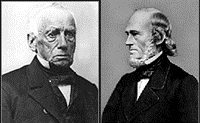
Ichabod Washburn (1798–1868) was an American Congregational deacon and industrialist from Worcester County, Massachusetts. His financial endowments led to the naming of Washburn College, now Washburn University in Topeka, Kansas and the foundation of Worcester Polytechnic Institute in Worcester, Massachusetts.
Washburn became an apprentice in a Leicester, Massachusetts blacksmith shop at the age of sixteen. He attended Leicester Academy with his distant relative Emory Washburn (later Governor of Massachusetts) and Stephen Salisbury II, both of whom would many years later help in the founding of Worcester Polytechnic Institute.
By 1865, Washburn was co-proprietor (with his son-in-law Philip Moen) of Washburn and Moen Manufacturing Company, the world's largest wire mill. The company manufactured piano wire, crinoline and supports for hoop skirts, wire for fences and other similar products.
Worcester Polytechnic Institute
Washburn was interested in setting up a vocational school for mechanics and wrote:
I have long been satisfied that a course of instruction might be adopted in the education of apprentices to mechanical employments, whereby moral and intellectual training might be united with the processes by which the arts of mechanism as well as skill in the use and adaptation of tools and machinery are taught, so as to elevate our mechanics as a class in the scale of intelligence and influence, and add to their personal independence and happiness, while it renders them better and more useful citizens, and so more like our Divine Master, whose youth combined the conversations of the learned with the duties of a mechanic's son, and whose ideas and teachings now underlie the civilization of the world.
Along with John Boynton, another prominent Worcester industrialist, he founded the Worcester County Free Institute of Industrial Science in 1865. Its name was later changed to Worcester Polytechnic Institute. The collaboration between Boynton, who wanted to teach science, and Washburn, who wanted to teach vocational skills, led to the university's philosophy of "theory and practice."
Washburn suffered a paralyzing stroke in February 1868 and died on December 31 of that year, only a month after the Institute opened and before the completion of the shop building. Boynton died before the first class entered in 1868. Their contributions to WPI in its infancy are memorialized by Boynton Hall and Washburn Shops, the first two buildings on the campus.

Washburn University
Lincoln College, established in 1865 at Topeka, Kansas, changed its name in 1868 to Washburn college after receiving a bequest of $25,000 from Ichabod Washburn's estate.
 Washburn College adopted a variation of the Washbourne arms as its emblem, substituting the school colors for the tinctures of the arms. Since becoming a university, however, Washburn has abandoned use of the family arms. Instead, the university now employs a stylized "W" as the emblem of the institution. The school mascot, "The Ichabod", is still in use.
Washburn College adopted a variation of the Washbourne arms as its emblem, substituting the school colors for the tinctures of the arms. Since becoming a university, however, Washburn has abandoned use of the family arms. Instead, the university now employs a stylized "W" as the emblem of the institution. The school mascot, "The Ichabod", is still in use.
"The Ichabod" existed only in name until 1938, when alumnus (and later prominent graphic artist) Bradbury Thompson created the studious-looking, tailcoat-wearing figure the university uses today. The athletic teams are nicknamed "the Ichabods".
References
- ^ "WPI's Founding Fathers: Ichabod Washburn". Archived from the original on 2006-09-01. Retrieved 2006-12-31.
- "Letter of gift from I. Washburn to Trustees, March, 1866". Archived from the original on 2005-10-29. Retrieved 2006-12-31.
- ^ "WPI's Founding Fathers: John Boynton". Archived from the original on 2006-09-01. Retrieved 2006-12-31.
- ^ Washburn University Archived 2007-09-27 at the Wayback Machine
External links
| Washburn University | |||||||||
|---|---|---|---|---|---|---|---|---|---|
| Academics |  | ||||||||
| Athletics |
| ||||||||
| Misc. | |||||||||
| |||||||||